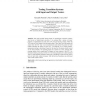Free Online Productivity Tools
i2Speak
i2Symbol
i2OCR
iTex2Img
iWeb2Print
iWeb2Shot
i2Type
iPdf2Split
iPdf2Merge
i2Bopomofo
i2Arabic
i2Style
i2Image
i2PDF
iLatex2Rtf
Sci2ools
114
click to vote
PTS
2003
2003
Testing Transition Systems with Input and Output Testers
The paper studies testing based on input/output transition systems, also known as input/output automata. It is assumed that a tester can never prevent an implementation under test (IUT) from producing outputs, while the IUT does not block inputs from the tester, either. Thus, input from the tester and output from the IUT may occur simultaneously and should be queued in finite buffers between the tester and the IUT. A framework for so-called queuedquiescence testing is developed, based on the idea that the tester should consist of two test processes, one applying inputs via a queue to an IUT and the other reading outputs from a queue until it detects no more outputs of the IUT, i.e., the tester detects quiescence of the IUT. The testing framework is then extended with so-called queued-suspension testing by considering a tester that has several pairs of input and output processes. Test derivation procedures are elaborated with a fault model in mind.
Input/output Transition Systems | PTS 2003 | PTS 2007 | So-called Queuedquiescence Testing | Tester Detects Quiescence |
Related Content
| Added | 01 Nov 2010 |
| Updated | 01 Nov 2010 |
| Type | Conference |
| Year | 2003 |
| Where | PTS |
| Authors | Alexandre Petrenko, Nina Yevtushenko, Jiale Huo |
Comments (0)

